八年级英语比较级最高级
- 格式:docx
- 大小:11.57 KB
- 文档页数:3
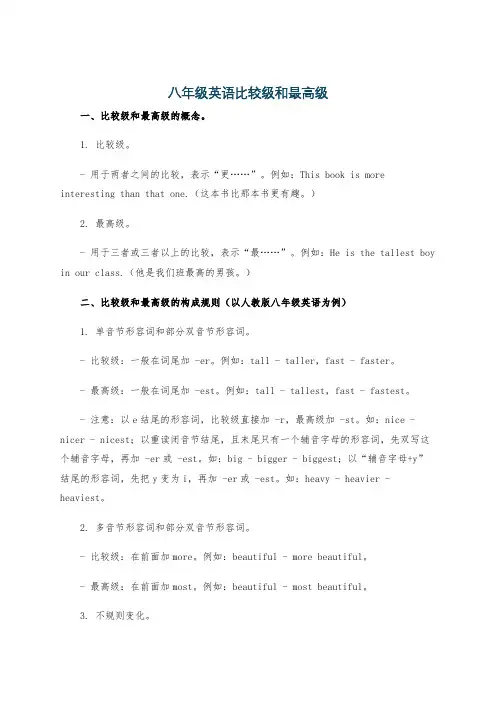
八年级英语比较级和最高级一、比较级和最高级的概念。
1. 比较级。
- 用于两者之间的比较,表示“更……”。
例如:This book is more interesting than that one.(这本书比那本书更有趣。
)2. 最高级。
- 用于三者或三者以上的比较,表示“最……”。
例如:He is the tallest boy in our class.(他是我们班最高的男孩。
)二、比较级和最高级的构成规则(以人教版八年级英语为例)1. 单音节形容词和部分双音节形容词。
- 比较级:一般在词尾加 -er。
例如:tall - taller,fast - faster。
- 最高级:一般在词尾加 -est。
例如:tall - tallest,fast - fastest。
- 注意:以e结尾的形容词,比较级直接加 -r,最高级加 -st。
如:nice - nicer - nicest;以重读闭音节结尾,且末尾只有一个辅音字母的形容词,先双写这个辅音字母,再加 -er或 -est。
如:big - bigger - biggest;以“辅音字母+y”结尾的形容词,先把y变为i,再加 -er或 -est。
如:heavy - heavier - heaviest。
2. 多音节形容词和部分双音节形容词。
- 比较级:在前面加more。
例如:beautiful - more beautiful。
- 最高级:在前面加most。
例如:beautiful - most beautiful。
3. 不规则变化。
- 一些形容词的比较级和最高级有不规则变化。
例如:- good/well - better - best.- bad/badly - worse - worst.- many/much - more - most.- little - less - least.- far - farther/further - farthest/furthest(farther表示距离上更远;further表示程度上更进一步)三、比较级和最高级的用法。
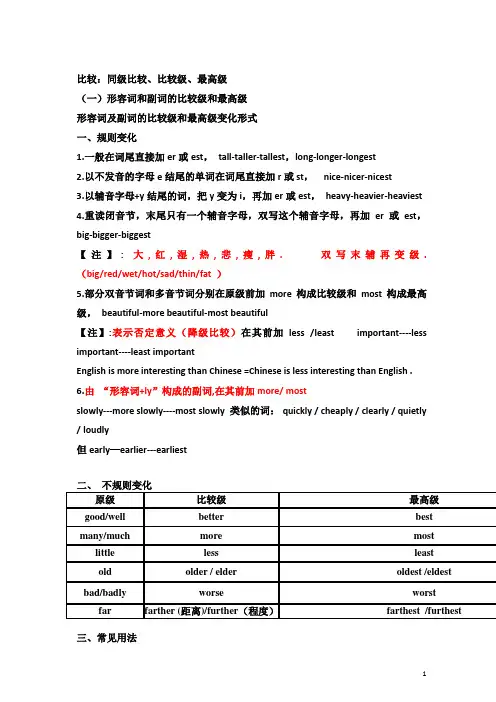
比较:同级比较、比较级、最高级(一)形容词和副词的比较级和最高级形容词及副词的比较级和最高级变化形式一、规则变化1.一般在词尾直接加er或est,tall-taller-tallest,long-longer-longest2.以不发音的字母e结尾的单词在词尾直接加r或st,nice-nicer-nicest3.以辅音字母+y结尾的词,把y变为i,再加er或est,heavy-heavier-heaviest4.重读闭音节,末尾只有一个辅音字母,双写这个辅音字母,再加er或est,big-bigger-biggest【注】: 大,红,湿,热,悲,瘦,胖. 双写末辅再变级.(big/red/wet/hot/sad/thin/fat )5.部分双音节词和多音节词分别在原级前加more构成比较级和most构成最高级,beautiful-more beautiful-most beautiful【注】:表示否定意义(降级比较)在其前加less /least important----less important----least importantEnglish is more interesting than Chinese =Chinese is less interesting than English . 6.由“形容词+ly”构成的副词,在其前加more/ mostslowly---more slowly----most slowly 类似的词:quickly / cheaply / clearly / quietly / loudly但early—earlier---earliest三、常见用法*比较级考点:1.形容词或副词的比较级+than。
如:You are taller than Tom. 你比Tom高。
可修饰比较级的词much even far still rather any a little a lot a bit2.the+比较级,the+比较级。
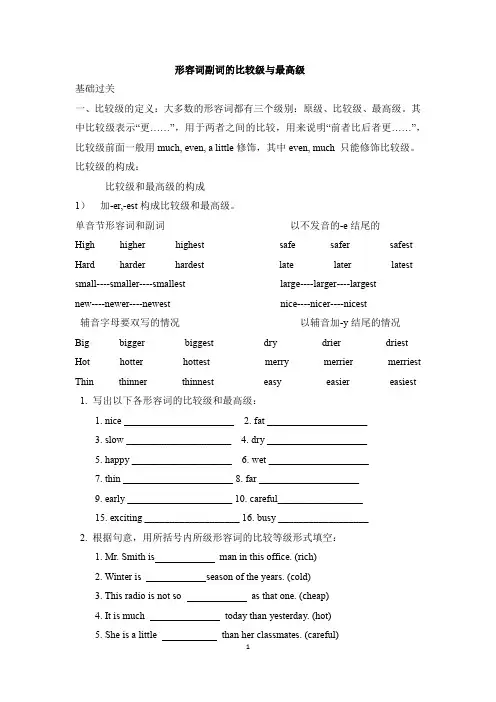
形容词副词的比较级与最高级基础过关一、比较级的定义:大多数的形容词都有三个级别:原级、比较级、最高级。
其中比较级表示“更……”,用于两者之间的比较,用来说明“前者比后者更……”,比较级前面一般用much, even, a little修饰,其中even, much 只能修饰比较级。
比较级的构成:比较级和最高级的构成1)加-er,-est构成比较级和最高级。
单音节形容词和副词以不发音的-e结尾的High higher highest safe safer safest Hard harder hardest late later latest small----smaller----smallest large----larger----largestnew----newer----newest nice----nicer----nicest辅音字母要双写的情况以辅音加-y结尾的情况Big bigger biggest dry drier driest Hot hotter hottest merry merrier merriest Thin thinner thinnest easy easier easiest 1. 写出以下各形容词的比较级和最高级:1. nice ______________________2. fat ____________________3. slow _____________________4. dry ____________________5. happy ____________________6. wet ____________________7. thin ______________________ 8. far ____________________9. early _____________________ 10. careful_________________15. exciting ___________________ 16. busy __________________2. 根据句意,用所括号内所级形容词的比较等级形式填空:1. Mr. Smith is man in this office. (rich)2. Winter is season of the years. (cold)3. This radio is not so as that one. (cheap)4. It is much today than yesterday. (hot)5. She is a little than her classmates. (careful)6. people came to the meeting than last time. (many)7. Which book is , this one or that one? (easy)8. My room is than yours. (small)9. Hainan is from Beijing than Hunan. (far)10. Skating is than swimming. (exciting)11. Jim is than all the others. (honest)12. The higher you climb, the it will be. (cold)13.There are boys than girls in our class. (few)2) 加more, most构成比较级和最高级多音节的形容词由形容词加-ly构成的副词expensive more expensive most expensive slowly more slowly most slowly carefully more carefully most carefully highly more highly most highly 以-ful,-less,-able,-ous,-ive, -ing等结尾的双元音形容词useless more useless most uselessserious more serious most serious分词形容词tired,pleased及glad,often,real, right,wrong等单音节形容词。

八年级英语比较级和最高级复习thin thinner thinnesthot hotter hottestbig bigger biggestnew newer newesthigh higher highestcold colder coldesttall taller tallestdark darker darkesttall taller tallestuseful more useful most usefulbright brighter brightestbrave braver bravestinterested more interested most interested frightening more frightening most frightening doubtful more doubtful most doubtfulobscure more obscure most obscureclever cleverer cleverestpretty prettier prettiest(注意y变成i)silly sillier silliestbad worse worstfar farther farthest(只指距离)further furthest(用处较广;参见F,G)good better bestlittle less leastmany/much more mostold elder eldest(仅指人)older oldest(指人和物)farther/farthest和further/furthest以上含盖了所以的变形形式构成法原级比较级最高级一般单音节词 tall(高的) taller tallest未尾加-er,-est great(巨大的) greater greatest以不发音的e结尾 nice(好的) nicer nicest的单音词和少数 large(大的) larger largest以- le结尾的双 able(有能力的) abler ablest音节词只加-r,-st以一个辅音字母 big(大的) bigger biggest结尾的闭音节单 hot热的) hotter hottest音节词,双写结尾的辅音字母,再加-er,-est"以辅音字母+y" easy(容易的) easier easiest结尾的双音节词,busy(忙的) busier busiest改y为i,再加-er,-est少数以-er,-ow clever(聪明的) cleverer cleverest结尾的双音节词 narrow(窄的) narrower narrowest未尾加-er,-est其他双音节词和 important(重要的)多音节词,在前 more important面加more,most most important来构成比较级和 easily(容易地)最高级。
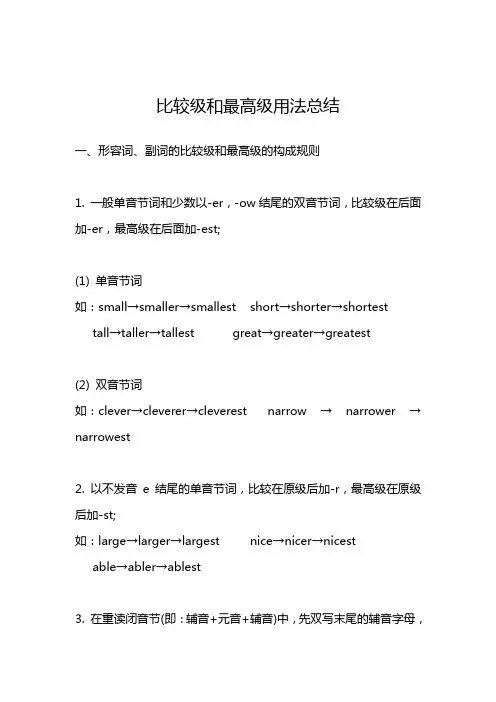
比较级和最高级用法总结一、形容词、副词的比较级和最高级的构成规则1. 一般单音节词和少数以-er,-ow结尾的双音节词,比较级在后面加-er,最高级在后面加-est;(1) 单音节词如:small→smaller→smallest short→shorter→shortest tall→taller→tallest great→greater→greatest(2) 双音节词如:clever→cleverer→cleverest narrow→narrower→narrowest2. 以不发音e结尾的单音节词,比较在原级后加-r,最高级在原级后加-st;如:large→larger→largest nice→nicer→nicest able→abler→ablest3. 在重读闭音节(即:辅音+元音+辅音)中,先双写末尾的辅音字母,比较级加-er,最高级加-est;如:big→bigger→biggest hot→hotter→hottest fat→fatter→fattest4. 以“辅音字母+y”结尾的双音节词,把y改为i,比较级加-er,最高级加-est;如:easy→easier→easiest heavy→heavier→heaviest busy→busier→busiest happy→happier→happiest5. 其他双音节词和多音节词,比较级在前面加more,最高级在前面加most;如:beautiful→more beautiful→most beautifuldifferent→more different→most differenteasily→more easily→most easily注意:①形容词最高级前通常必须用定冠词the,副词最高级前可不用。
例句:The Sahara is the biggest desert in the world.②形容词most前面没有the,不表示最高级的含义,只表示"非常"。
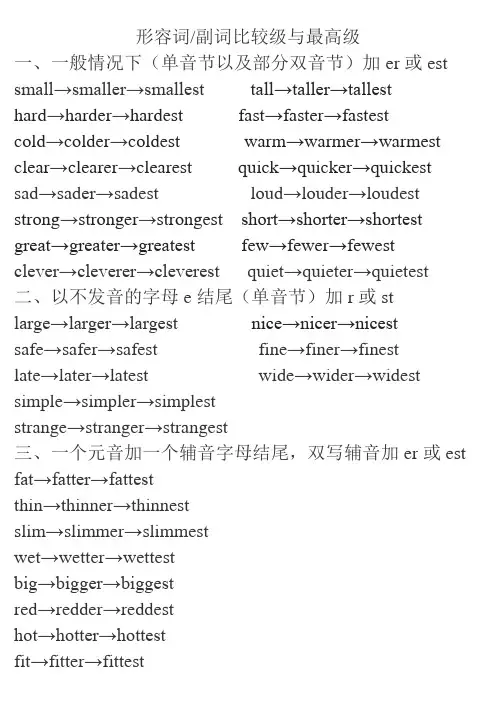
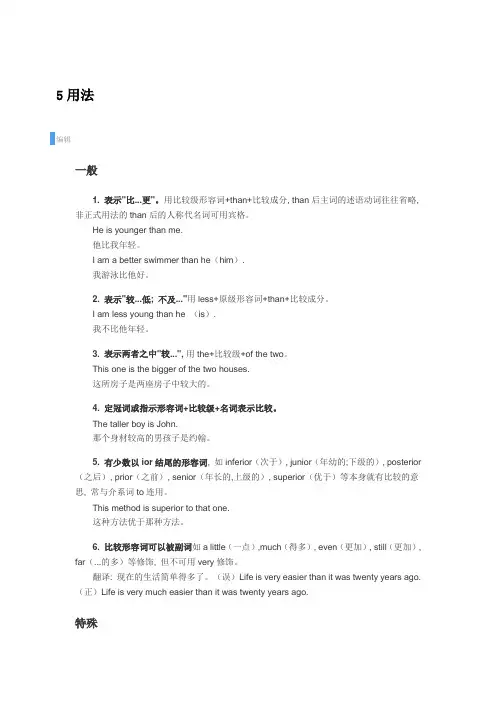
5用法编辑一般1. 表示"比...更"。
用比较级形容词+than+比较成分, than后主词的述语动词往往省略,非正式用法的than后的人称代名词可用宾格。
He is younger than me.他比我年轻。
I am a better swimmer than he(him).我游泳比他好。
2. 表示"较...低; 不及..."用less+原级形容词+than+比较成分。
I am less young than he (is).我不比他年轻。
3. 表示两者之中"较...", 用the+比较级+of the two。
This one is the bigger of the two houses.这所房子是两座房子中较大的。
4. 定冠词或指示形容词+比较级+名词表示比较。
The taller boy is John.那个身材较高的男孩子是约翰。
5. 有少数以ior结尾的形容词, 如inferior(次于), junior(年幼的;下级的), posterior(之后), prior(之前), senior(年长的,上级的), superior(优于)等本身就有比较的意思, 常与介系词to连用。
This method is superior to that one.这种方法优于那种方法。
6. 比较形容词可以被副词如a little(一点),much(得多), even(更加), still(更加),far(...的多)等修饰, 但不可用very修饰。
翻译: 现在的生活简单得多了。
(误)Life is very easier than it was twenty years ago.(正)Life is very much easier than it was twenty years ago.特殊.no more… than… 与……一样不…….not more…than… 没有……那样……,不如…….not less… than… 不亚于……..more than… 不止,仅仅,非常,极其This more than satisfied me. ..more than a little 非常..not more than 不多于no (not any)more than不过,仅仅..no less than 有……之多,多达not less than 至少,不下于..neither more nor less than 恰好,不多不少,简直,和……完全一样..better than 多于,超过It is better than 20 km to the station...(in)less than no time 立即,一会儿..(be)little/no better than 实际上,简直就是..nothing less than 完全是,和……一模一样..all the more 越发,更加..any (the)less 较小/更小一些,小的..all the better 更好,更加.so much the better/worse (for sb./sth.)甚至更好/更坏..go one better (than sb./sth.)胜过……一筹..more…than… 与其说……不如说……..would sooner/rather…than 与其……宁愿..(be)more like…than 不像……倒像..rather…than…/rather than 宁可……而不..other than 除了……,除……之外..rather…than otherwise 不是别的而是..no/none other than 正是,除……之外无其他..no more 不再,不复存在,也不,也没有..less than 不……..more often than no 经常,多半..see more/less of someone 更常/少见;再/少见到……..none + the + 比较级毫不……,毫无…….have seen better days 情况转坏..think better of sth. 改变……的念头..for better or (for)worse 无论好坏,同甘共苦..all the better 因……而更加..more than meets the eye/ear 另有隐情,并非表面那么简单的..More is meant than, meets the ear. 意在言外..There is more (to it )than meets the eyes. 现象背后有文章..the+比较级……,the+比较级……. 越……,越…….无比较级单词编辑.表示国籍的形容词没有比较级和最高级..例如:Chinese(中国的),English(英国的),Japanese(日本的)等等..表示方位和时间的形容词没有比较级和最高级..例如:east(东边的,东方的),west(西边的,西方的)past(过去的)等等..表示绝对概念的词和已达极限的形容词没有比较级和最高级..例如:perfect(完美的),blind(瞎的),dead(死的)等等..说明物体材质和形状的形容词没有比较级和最高级..例如:solid(固体的),round(圆形的),plastic(塑料的)等等..表示数字、顺序或者时间的形容词没有比较级和最高级..例如:next(下一个),several(若干的),daily(每天的)等等..在语法上做表语的表示状态的形容词没有比较级和最高级..例如:alone(孤独的),awake(醒来的),alive(活着的)等等..本身就有比较级含义的形容词没有比较级和最高级.例如:junior(年少的),minor(次要的),superior(上等的)等等.同样,此类词汇的另一个特点是:不能用表示程度的副词如(very ,so)等等来修饰.例如:very dead, so awake是错误的基本句型编辑同级比较.由“...as + 形容词原型+ as...”或“...as + 形容词+ 名词+ as...”构成。
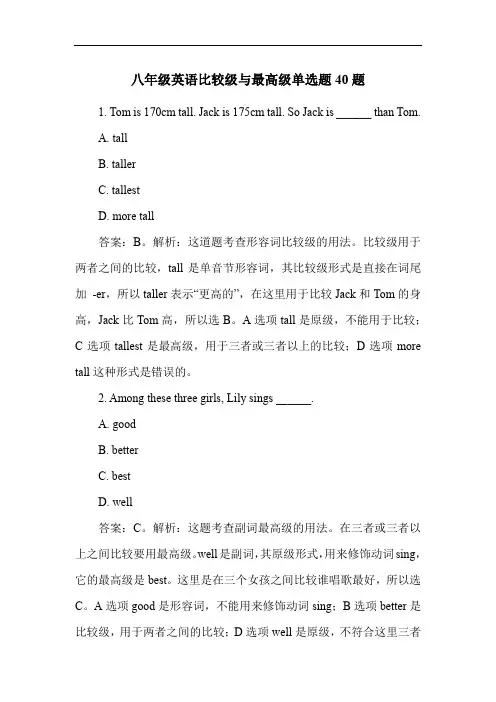
八年级英语比较级与最高级单选题40题1. Tom is 170cm tall. Jack is 175cm tall. So Jack is ______ than Tom.A. tallB. tallerC. tallestD. more tall答案:B。
解析:这道题考查形容词比较级的用法。
比较级用于两者之间的比较,tall是单音节形容词,其比较级形式是直接在词尾加-er,所以taller表示“更高的”,在这里用于比较Jack和Tom的身高,Jack比Tom高,所以选B。
A选项tall是原级,不能用于比较;C选项tallest是最高级,用于三者或三者以上的比较;D选项more tall这种形式是错误的。
2. Among these three girls, Lily sings ______.A. goodB. betterC. bestD. well答案:C。
解析:这题考查副词最高级的用法。
在三者或三者以上之间比较要用最高级。
well是副词,其原级形式,用来修饰动词sing,它的最高级是best。
这里是在三个女孩之间比较谁唱歌最好,所以选C。
A选项good是形容词,不能用来修饰动词sing;B选项better是比较级,用于两者之间的比较;D选项well是原级,不符合这里三者比较的语境。
3. My English score is 90. His English score is 95. His score is ______ than mine.A. higherB. highC. highestD. more high答案:A。
解析:本题考查形容词比较级。
句中是在比较“我”和“他”的英语成绩,两者比较要用比较级。
high是单音节形容词,比较级形式是higher,表示“更高的”。
B选项high是原级;C选项highest 是最高级,用于三者或三者以上比较;D选项more high形式错误。
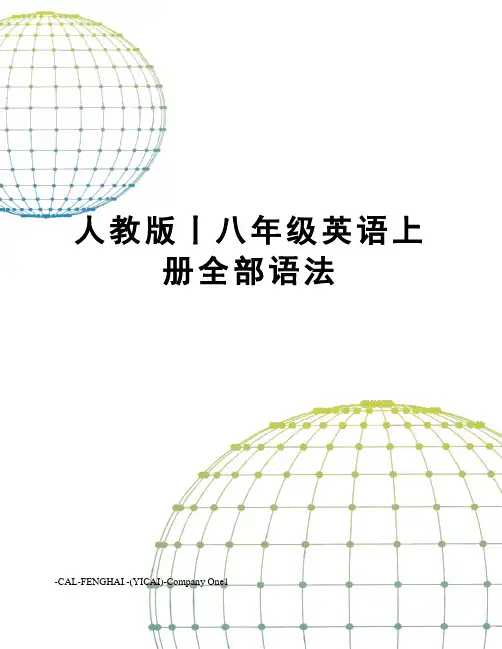
人教版丨八年级英语上册全部语法-CAL-FENGHAI.-(YICAI)-Company One1人教版丨八年级英语上册全部语法一. 形容词/副词的比较级和最高级1. 形容词/副词的比较级和最高级的构成规则(1)单音节词和少数以-er,-ow结尾的双音节单词,比较级在后面加-er,最高级在后面加-est。
①单音节单词small→smaller→smallestshort→shorter→shortest tall→taller→tallestgreat→greater→greatest②少数以-er,-ow结尾的双音节单词clever→cleverer→cleverestnarrow→narrower→narrowest(2)以不发音e结尾的单音节单词,比较级在原形后加-r,最高级在原级后加-st。
large→larger→largestnice→nicer→nicestable→abler→ablest(3)以一个辅音字母结尾的闭音节(即:辅音+元音+辅音)单词中,先双写末尾的辅音字母,比较级加-er,最高级加-est。
big→bigger→biggesthot→hotter→hottestfat→fatter→fattest(4)以“辅音字母+y”结尾的双音节词,把y改为i,比较级加-er,最高级加-est。
easy→easier→easiestheavy→heavier→heaviest busy→busier→busiesthappy→happier→happiest(5)其他双音节词和多音节词,比较级在前面加more,最高级在前面加most。
beautiful→more beautiful→most beautifuldifferent→more different→most different easily→more easily→most easily(6)有少数形容词、副词的比较级和最高级是不规则的,必须熟记。
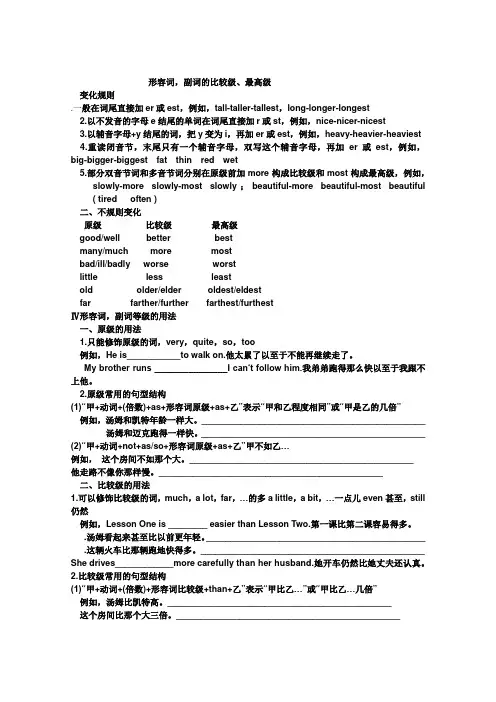
形容词,副词的比较级、最高级变化规则.一般在词尾直接加er或est,例如,tall-taller-tallest,long-longer-longest2.以不发音的字母e结尾的单词在词尾直接加r或st,例如,nice-nicer-nicest3.以辅音字母+y结尾的词,把y变为i,再加er或est,例如,heavy-heavier-heaviest4.重读闭音节,末尾只有一个辅音字母,双写这个辅音字母,再加er或est,例如,big-bigger-biggest fat thin red wet5.部分双音节词和多音节词分别在原级前加more构成比较级和most构成最高级,例如,slowly-more slowly-most slowly;beautiful-more beautiful-most beautiful ( tired often )二、不规则变化原级比较级最高级good/well better bestmany/much more mostbad/ill/badly worse worstlittle less leastold older/elder oldest/eldestfar farther/further farthest/furthestⅣ形容词,副词等级的用法一、原级的用法1.只能修饰原级的词,very,quite,so,too例如,He is___________to walk on.他太累了以至于不能再继续走了。
My brother runs _______________I can‘t follow him.我弟弟跑得那么快以至于我跟不上他。
2.原级常用的句型结构(1)“甲+动词+(倍数)+as+形容词原级+as+乙”表示“甲和乙程度相同”或“甲是乙的几倍”例如,汤姆和凯特年龄一样大。
______________________________________________ 汤姆和迈克跑得一样快。

八年级英语比较级和最高级讲解与练习比较级和最高级一、比较级的用法:当两个人或事物(A和B)进行比较时,我们需要用到形容词(副词)的原级或者比较级1.表达“A和B一样”,用as…as的结构。
公式:A+be动词+as+形容词原级+as…+BA+实义动词+as+副词原级+as…+BEgI am as tall as you.He runs as fast as I.我的房间和她的一样大。
他游得和我一样好。
2.表达“A不如B”用not as…as的结构。
公式:A+be动词的否定形式+as+形容词原级+as…+BA+助词的否定形式+动词+as+形容词原级+as…+BEgI am not as tall as you.He doesn’t run as fast as I.我的房间没有他的大。
我没有他游得好。
3.表达“A大于B”用“比力级+than”的布局。
公式:A+be动词+形容词比较级+than+B…A+实义动词+副词比较级+than+B…EgI am taller than you.我比你高。
XXX faster than I.他跑得比我快。
我的房间比他的大。
我游得比他的好。
4.透露表现A是...中最大的布局公式:A+be动词+the +形容词最高级+范围A+实义动词+the+形容词最高级+范围I am XXX.XXX.我的房间是这里最大的。
我游得是我们班最好的。
二.形容词和副词的比较级和最高级的变化方法如下(1)吻合划定规矩的:情况一般情况以不发音e结尾的词以“子音+y”末端的词加法直接加-er ; -est去e加–er ; -est变y为i再加-er ; -est双写末尾辅音字母,再加-er ;重读闭音节末端的词-est在词前加more ; mostXXX-XXX-XXXmore deliciousmost delicious例词all-XXXXXXXXXheavy-heavier-heaviest多音节和局部双音节单词(2)几个不规则的形容词和副词的比较级和最高级如下表:原级good , wellbad , illmany , muchlittlefar练1:写出下列词的比较级和最高级tall﹍﹍﹍﹍slow﹍﹍﹍﹍small﹍﹍﹍﹍fast﹍﹍﹍﹍smart ﹍﹍﹍﹍few﹍﹍﹍﹍nice﹍﹍﹍﹍fine﹍﹍﹍﹍large﹍﹍﹍﹍late﹍﹍﹍﹍brave﹍﹍﹍﹍pretty﹍﹍﹍﹍easy﹍﹍﹍﹍funny﹍﹍﹍﹍happy﹍﹍﹍﹍lazy﹍﹍﹍﹍heavy﹍﹍﹍﹍dirty﹍﹍﹍﹍dry﹍﹍﹍﹍early﹍﹍﹍﹍比较级betterworsemorelessXXX最高级XXXworstmostleastXXX﹍﹍﹍﹍slim﹍﹍﹍﹍hot﹍﹍﹍﹍big﹍﹍﹍﹍thin﹍﹍﹍﹍fat﹍﹍﹍﹍wet﹍﹍﹍﹍beautiful﹍﹍﹍﹍﹍﹍﹍﹍interesting﹍﹍﹍﹍﹍﹍﹍﹍important﹍﹍﹍﹍﹍﹍﹍﹍dangerous﹍﹍﹍﹍﹍﹍﹍﹍expensive﹍﹍﹍﹍﹍﹍﹍﹍polite﹍﹍﹍﹍﹍﹍﹍﹍careful﹍﹍﹍﹍﹍﹍﹍﹍exciting﹍﹍﹍﹍bad/badly/ill﹍﹍﹍﹍little﹍﹍﹍﹍many/much﹍﹍﹍﹍old﹍﹍﹍﹍﹍﹍﹍﹍far﹍﹍﹍﹍﹍﹍﹍﹍练2填空1. Bob is_________ ( young ) than Fred but ___________(tall) than Fred.2. Yingtian is not as ___________(tall) as Yongxian.3. Almost all the students' faces are the same but Li Deming looks _______(fat) than before .4.Which is _________(heavy), a hen or a chicken?5. He is ______ (bad) at learning maths. He is much_______ (bad) at Chinese and he is the_________ (bad) at English.6. Annie says Sally is the ________ (kind) person in the world.7. An orange ia a little ______ (big) than an apple, but much ________ (small) XXX River is the_______ (long) river in China.9. Sue is a little ___________ (beautiful) than her sister.10.My room is not as_________(big) XXX' s.11.--How difficult is physics?--I' m not sure.--Is it ________(difficult) than maths?--I don' t think so.12.-- Annie plays the piano very ___________ (well).-- Sue plays it _____ (well) than Annie. And Sally plays it the _______(well).13. Saturdayis my_________ (busy) day in a week.操演3:挑选1. Which do you like _______, XXX coffee?A. XXX2.This work is _______ for me than for you.A. XXX difficult3.Who jumped_______of all?A. XXX4.Li Lei is_______ student in our class.A. XXX5. Tom is one of _______ boys in our class.A. XXX6. English is one of_______ XXX.A. XXXXXX7. Which is_______, Li Lei or Wu Tong?A. XXX..Jean works hard but she doesn’t work ____ Mary.A, XXX, as hard thanC, as harder asD, as hard as9.This is ____ book in our library.A, the most interestingB, most interestingC, the more interestingD, more interesting10.They got a Christmas tree and it was ____ ours.A, so tall asB, so taller asC, as tall asD, as taller as11.A taxi doesn’t run as ____ as an XXX.A, fastB, fasterC, fastestD, more fast12.Yangpu Bridge is one of ____ in the world.A, bigger bridgeB, the biggest bridgeC, the biggest bridgesD, bigger bridges13.Her cousin can draw ____ an artist.A, as well asB, not so well asC, as better asD, as good as14.Jinmao Tower is ____ building in Shanghai.A, highB, tallC, highestD, the tallest15. This box is___ that one.A. heavy thanB. so heavy thanC. heavier asD. as heavy as16 I think the story is not so ___ as that one.。
八年级上册英语语法《形容词的比较级和最高级》知识点形容词的比较级和最高级一、比较级的定义:大多数的形容词都有三个级别:原级、比较级、最高级。
其中比较级表示“更……”,用于两者之间的比较,用来说明“前者比后者更……”,比较级前面一般用much, even, a little修饰,其中even, much只能修饰比较级。
二、比较级的构成:(1)规则变化:①单音节和部分双音节的形容词一般在词尾加-erEg: calm---XXX---XXX---smarter②以字母e结尾的直接在词尾加-rEg: nice---nicerfine---finerlarge---larger③以“辅音+y结尾的词,变y为i,再加-er”Eg: early---XXX---happierbusy---XXX④以重读闭音节的单个子音字母结尾的词,双写子音字母,再加-erEg: big---XXX---XXX---XXX⑤多音节或部分双音节的形容词在原级前面加moreEg: popular---more popularimportant---more important(2)不划定规矩变革:少数形容词的比较级变化是不规则的:good---XXX/ill---worsemany/much---morelittle---lessfar---XXX---older/elder三、比力级的用法:(一)当两小我或事物(A和B)举行比力时,我们需要用到描述词(副词)的原级或者比力级1.表达“A和B一样”,用as…as的结构。
公式: A+be动词+as+描述词原级+as…+BA+实义动词+as+副词原级+as…+BEg:I am as tall as you.我和你一样高。
He runs as fast as I.他跑得和我一样快。
2.表达“A不如B”用not as…as的结构。
公式: A+be动词的否定形式+as+形容词原级+as…+BA+助词的否定形式+动词+as+形容词原级+as…+BEg:I am not as tall as you.我没有你高。
八年级比较级最高级知识点在英语学习中,比较级和最高级是非常重要的知识点,也是应用最广泛的语法形式之一。
本文将详细介绍八年级比较级最高级知识点,帮助大家更好地掌握这一语法。
一、比较级的构成比较级是通过在形容词前加“-er”或在前面加more来构成的,例如:1. big(大)→ bigger(更大)2. hot(热)→ hotter(更热)3. tall(高)→ taller(更高)需要注意的是,一些形容词比较级的构成比较特殊,如:1. good(好)→ better(更好)2. bad(坏)→ worse(更坏)3. many/much(多)→ more(更多)二、最高级的构成最高级是通过在形容词前加“-est”或在前面加most来构成的,例如:1. big(大)→ biggest(最大的)2. hot(热)→ hottest(最热的)3. tall(高)→ tallest(最高的)需要注意的是,一些形容词最高级的构成比较特殊,如:1. good(好)→ best(最好的)2. bad(坏)→ worst(最坏的)3. many/much(多)→ most(最多的)三、比较级和最高级的用法1. 比较级的用法(1)比较两个人或物的情况:例如:He is taller than his sister.(他比他妹妹高。
)My house is bigger than yours.(我的房子比你的大。
)(2)表示一个人或物的性质比另一个人或物更强的情况:例如:John is more intelligent than Tom.(约翰比汤姆更聪明。
)The coffee is hotter than the tea.(咖啡比茶更热。
)2. 最高级的用法(1)表示三个以上人或物中某一个的特定性质:例如:She is the tallest of the three girls.(她是三个女孩中最高的一个。
)This is the most beautiful painting in the exhibition.(这是展览中最美的画。
形容词的比较级级最高级一形容词或副词的比较级及最高级的构成规则:1.单音节词及部分双音节词(以-y结尾的形容词):○1一般在词末加+-er,-est○2.以辅音字母+y 结尾的词,y变i +-er -est 例:heavy heavier heaviest○3以e 结尾的形容词,直接在末尾+-r -st 例:fine finer finest ○4.以辅元辅,前无元结尾的形容词(重读闭音节),先双写末尾字母再加-er -est。
例:big bigger biggest1.大部分双音节词及多音节词在前加more ,most。
例:beautiful more beautiful most beautifulfriendly more friendly most friendly3 部分形容词的比较级,最高级不规则:需特殊记忆两多(much;many)两好(good;well)两坏(bad;badly)一少little 一老一远(far)完成下列形容词比较级的变换1funny (比较级)________ 2outgoing (比较级)_________3smart (比较级)_______4friendly(比较级)_____ 5.athletic (比较级)________ 6.thin(比较级)___________7.clever(比较级)_______ 8 good(比较级)________ 9big (比较级)___________10wild (比较级)________11 large(比较级)__________ 12 many(比较级)________-二句型表示两者之间比较的句型句型一A+动词+形容词(副词)的比较级+ than+B 表示A比B 更…形容词比较级的标志词:than A or B of the two ….例:○1.Tom is taller than I am/I/ me 。
形容词/副词比较级与最高级一、一般情况下(单音节以及部分双音节)加er或est small→smaller→smallest tall→taller→tallesthard→harder→hardest fast→faster→fastest cold→colder→coldest warm→warmer→warmest clear→clearer→clearest quick→quicker→quickest sad→sad er→sadest loud→louder→loudest strong→stronger→strongest short→shorter→shortest great→greater→greatest few→fewer→fewest clever→cleverer→cleverest quiet→quieter→quietest 二、以不发音的字母e结尾(单音节)加r或st large→larger→largest nice→nicer→nicestsafe→safer→safest fine→finer→finest late→later→latest wide→wider→widest simple→simpler→simplest strange→stranger→strangest 三、一个元音加一个辅音字母结尾,双写辅音加er或est fat→fatter→fattest thin→thinner→thinnest slim→slimmer→slimmest wet→wetter→wettest big→bigger→biggest red→redder→reddest hot→hotter→hottestfit→fitter→fittest 四、辅音字母加y结尾,变y为i加er或est easy→easier→easiest angry→angrier→angriest busy→busier→busiest heavy→heavier→heaviest hungry→hungrier→hungriest crazy→crazier→craziest happy→happier→happiest early→earlier→earliest dirty→dirtier→dirtiest lucky→luckier→luckiestshy→shier→shiest funny→funnier→funniest lovely→lovelier→loveliest friendly→friendlier→friendliest 五、双音节以及多音节词前加more或most outgoing→more outgoing→most outgoing beautiful→more beautiful→most beautifuldifferent→more different→most differentquietly→more quietly→most quietly loudly→more loudly→most loudly slowly→more slowly→mo st slowly quickly→more quickly→mo st quickly sadly→more sadly→mo st sadly happily→more happily→mo st happily carefully→more carefully→mo st carefully serious→more serious→most serious →mo st similar similar→more similar→moeasily easily→more easily→most e asily clearly→more clearly→mo st clearly bored→more bored→mo st bored talented→more talented→mo st talented boring→more boring→mo st boring →mo st popular popular→more popular→moterrible→more terrible→mo st terrible delicious→more delicious→mo st delicious →mo st different different→more different→mo→mo st difficult difficult→more difficult→mo→mo st beautiful beautiful→more beautiful→moexpensive→more expensive→mo st expensive necessary→more necessary→mo st necessary →mo st important important→more important→mo→mo st wonderful wonderful→more wonderful→mocomfortable→more comfortable→mo st comfortable hardworking→more hardworking→mo st hardworking 不规则adj、adv比较级、最高级good/well→better→best bad/badly/ill→worse→worst many/much→more→most few/little→less→least old→older/elder→oldest/eldest far→farther/further→farthest/furthest 无比较级的adj/adv fantastic excellent favorite true(ly) false right wrong full empty round square possible impossible 。
冠词测试题
1. Tomorrow is ______ Teachers' Day and we'll make ______ card for our English teacher.
2. The bus is running about seventy miles_____ hour.
3. Mary is interested in ______ science.
4. Some people don't like to talk at ______ table.
5. Last night I went to______ bed very late.
6. Don't worry. We still have ______ little time left.
7. What ______ beautiful day! And what ______ fine weather!
8. In ______ winter it is cold in ______ Beijing and warm in ________Shanghai.
9. John is______ cleverest boy in his class.
10. We can't live without ______ water or ______ air.
11. Tomorrow Mr. Smith will leave Paris, ______capital of______ France
forWashingtonby______ air.
12. We were having______ lunch when they came in.
13. This is ______ book you gave me last week.
14. What did you do ______ last Saturday?
15. March 8 is ______ Women's Day.
16. If ______ weather is fine tomorrow, we will go to the park.
17. I prefer playing ______ piano to playing ______ basketball.
18. At ______ age of five, he read a lot of books.
19. Tom and Lucy are of ______ same age.
20. ______ harder we study, ______ more we learn.
冠词答案:1. ×; a 2.an 3. × 4. × 5. × 6. a 7.a; × 8. ×; ×; × 9.the 10.×; × 11. the; ×; × 12. × 13.the 14.× 15. × 16.the 17.the; × 18.the 19.the 20. The; the
冠词练习题
1 ___ people attended the meeting last night.
A A hundred
B Hundred
C Hundreds of
2 He has already worked for ___ hour.
A the
B an
C a
3 He wrote a ___ report.
A two-thousand-words
B two-thousand-word
C two-thousands-word
D two-thousands-words
4 John is ___ university student.
A some
B any
C a
D an
5 That table is made of ___.
A a wood
B some wood
C the wood
D wood
6 He is a student of ___.
A Class First
B the Class One
C Class One
D First Class
7 I have been waiting for him for ___ hour and a half.
A the
B a
C an
D whole
8 John Smith is ___ honest man.
A one
B an
C the
D a
9 My father told me he was soon going to visit ___.
A the United State
B the United States
C United States
D Unites Stated
10 We are going to learn ___ next week.
A Lesson Twelve
B Lesson Twelfth
C Twelfth Lesson
D the Lesson Twelfth
11 About __ of the workers in that steel workers young people.
A third-fifths
B three-fifths
C three-fives
D three-fifth
12 Two ___ died of cold last winter.
A hundreds old people
B hundred old people
C hundreds old peoples
D hundred old peoples
13 Alice is fond of playing ___ piano while Henry is interested in listening to ___ music.
A /; the
B /; /
C the; /
D the; the
14 Oh John ___ you gave us!
A How a pleasant surprise
B How pleasant surprise
C What a pleasant surprise
D What pleasant surprise
15 Beyond ___ stars , the astronaut saw nothing but ___ space.
A the; /
B /; the
C /; /
D the; the
16 Alexander Graham Bell invented ___ telephone in 1876.
A (不填)
B a
C the
D one
17 The hero of the story is an artist in his ___.
A thirtieth
B thirty
C thirty’s
D thirties
18 ___ terrible weather we’ve been having these days!
A How a
B What a
C How
D What
19 Shortly after the accident, two ___ police were sent to the spot to keep order.
A dozen of
B dozens
C dozen
D dozens of
20 ---Where’s Jack? --- I think he’s still in ___ bed, but he might just be in ___ bathroom.
A (不填);(不填)
B the; the
C the; (不填) D(不填); the
21 Many people are still in ___ habit of writing silly things in ___ public places.
A the; the
B 不填;不填
C the; 不填
D 不填;the
22 She is ___ newcomer to ___ chemistry but she has already made some important discoveries.
A the; the
B the; 不填
C a; 不填
D a; the
23 Don’t all speak at once! ___, please.
A Each at one time
B One by one time
C One for each time
D One at a time
24 Many people agree that ___ knowledge of English is must in ___ international trade today.
A a; 不填
B the; an
C the; the
D 不填;the
答案:1-5 CBBCD 6-10 CCBBA 11-15 BBCCA
16-20 CDDCD 21-24 CCDA。